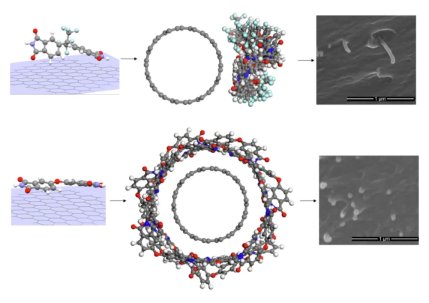Veröffentlichungen
Nach Erscheinungsjahr...
| 2016-2018 | 2019-2021 | 2022-2024 | 2025 |
| 2004-2006 | 2007-2009 | 2010-2012 | 2013-2015 |
| bis 1990 | 1991-1995 | 1996-2000 | 2001-2003 |
... oder nutzen Sie die
Neueste Veröffentlichungen
Crystallization and Melting of Polyethylene Strongly Cross-linked in the Molten State
Jingqing Li, Weihua Wang, Yunxiang Shi, Barbara Heck, Chuanfu Luo, Jesper de Claville Christiansen, Donghong Yu, Günter Reiter, Shichun Jiang. Soft Matter 21 (2025) 6422
 We examined the crystallization and melting behavior of highly cross-linked polyethylene (xPE) samples, including structural characterization of the resulting crystalline domains. Using γ-ray irradiation, cross-linking was performed in the molten state and not in the solid state. This approach assured a statistical and homogeneous distribution of the cross-link points. Upon increasing the radiation dose, the molecular weight of the strands connecting the cross-link points reached values even lower than that of the strands between physical entanglements. (more...)
We examined the crystallization and melting behavior of highly cross-linked polyethylene (xPE) samples, including structural characterization of the resulting crystalline domains. Using γ-ray irradiation, cross-linking was performed in the molten state and not in the solid state. This approach assured a statistical and homogeneous distribution of the cross-link points. Upon increasing the radiation dose, the molecular weight of the strands connecting the cross-link points reached values even lower than that of the strands between physical entanglements. (more...)
The size of critical secondary nuclei of polymer crystals does not depend on supersaturation
Yang Liu, Zhiqi Wang, Yao Zhang, Tianyu Wu, Tianze Zheng, Bao Hua Guo, Günter Reiter, Jun Xu. Nature Communications 16 (2025) 3773
It is still a great challenge to determine the size of critical nuclei, which is crucial for a comprehensive understanding of crystallization and for testing the controversial crystallization theories. Here, we propose a method to determine the size of critical secondary nuclei on growth faces of poly(butylene succinate) single crystals in solution, basing on the probability of statistically selecting crystallizable units in random copolymers. In a dilute solution and for a given crystallization temperature, we reveal that the size of critical secondary nuclei was independent of supersaturation, contrary to the well-accepted prediction of existing theories which expect that the size of the critical nucleus increases with decreasing supersaturation. Accounting correctly for the dilution-caused change in the steady-state concentration of clusters of various sizes, we remedy inconsistencies of existing theoretical approaches in deriving the correct size of critical secondary nuclei in solution being independent of supersaturation. (more...)
Binghua Wang, Hailong Zou, Xuchen Wang, Changyu Shen, Jingbo Chen, Günter Reiter, Bin Zhang. Nature Communications 16 (2025) 3275
The dissolution of polymer crystals often proceeds at rates varying in time and space. Here, using low molecular weight poly(ethylene oxide) as a model polymer, we exploit step-wise selective dissolution for unveiling how spatial variations in metastability are generated during the growth of lamellar polymer single crystals. The dissolution velocity along defined crystal faces is constant, but ca. 5 times faster for rough than for smooth faces. From the temperature dependence of dissolution, we derive detachment energies of 420 ± 40 kJ/mol and 650 ± 50 kJ/mol for rough and smooth faces, respectively, suggesting that on a rough face polymer chains have ca. 1/3 less neighboring molecules to interact with. The observed high values of the activation energy indicate that, for dissolving a polymer crystal, the progressive detachment of whole chains is indispensable. Our study reveals a strong relation between growth kinetics and the resulting metastability of polymer crystals. (more...)
Baode Zhang, Snežana D. Zarić, Sonja S. Zrilić, Iosif Gofman, Barbara Heck, Günter Reiter. Communications Chemistry 8 (2025) 21
 The interplay between attractive London dispersion forces and steric effects due to repulsive forces resulting from the Pauli principle often determines the geometry and stability of nanostructures. Aromatic polyimides (PI) and carbon nanotubes (CNT) were chosen as building blocks as two components in the hetero delocalized electron nanostructures. Two PIs, having the same diamine part and different linkage substituents between two phenyl rings of dianhydride part, one linked with ether bond (C-O-C) (OPI), the other with C-(CF3)2 (FPI), were investigated. Surprisingly, two CNT/PI nanocomposites show distinct failure mode from CNT yielding to CNT pull-out failure. Calculation of the interaction energy and chain conformations of each PI upon CNT was performed by accurate density functional theory (DFT) calculations and molecular dynamic simulation (MDS). (more...)
The interplay between attractive London dispersion forces and steric effects due to repulsive forces resulting from the Pauli principle often determines the geometry and stability of nanostructures. Aromatic polyimides (PI) and carbon nanotubes (CNT) were chosen as building blocks as two components in the hetero delocalized electron nanostructures. Two PIs, having the same diamine part and different linkage substituents between two phenyl rings of dianhydride part, one linked with ether bond (C-O-C) (OPI), the other with C-(CF3)2 (FPI), were investigated. Surprisingly, two CNT/PI nanocomposites show distinct failure mode from CNT yielding to CNT pull-out failure. Calculation of the interaction energy and chain conformations of each PI upon CNT was performed by accurate density functional theory (DFT) calculations and molecular dynamic simulation (MDS). (more...)
Liste der Veröffentlichungen
- Negative excess interfacial entropy between free and end-grafted chemically identical polymers
- G. Reiter, R. Khanna. Phys. Rev. Lett. 85, 5599-5602 (2000)
- The ABC of Pattern Evolution in Self-destruction of Thin Polymer Films
- R. Khanna, A. Sharma, G. Reiter. EPJdirect E 2, 1-9 (2000)
- Enhanced Instability in Thin Liquid Films by Improved Compatibility
- G. Reiter, R. Khanna, A. Sharma. Phys. Rev. Lett. 85, 1432-1435 (2000)
- Friction of an Elastomer Sliding on Polymeric Model Surfaces
- A. Casoli, M. Brendlé, J. Schultz, P. Auroy, G. Reiter. Tribology Lett. 8, 249-253 (2000)
- Real time determination of the slippage length in autophobic polymer dewetting
- G. Reiter, R. Khanna. Phys. Rev. Lett. 85, 2753-2756 (2000)
- Kinetics of Autophobic Dewetting of Polymer Films
- G. Reiter, R. Khanna. Langmuir 16, 6351-6357 (2000)
- Morphologies of Diblock Copolymer Thin Films Before and After Crystallization
- G. Reiter, G. Castelein, P. Hoerner, G. Riess, J.-U. Sommer, G. Floudas. Eur. Phys. J. E. 2, 319-334 (2000)
- Polymer Crystallization in Quasi-2 Dimensions: II. Kinetic Models and Computer Simulations
- J.-U. Sommer, G. Reiter. J. Chem. Phys. 112, 4384-4393 (2000)
- Polymer Crystallization in Quasi-2 Dimensions: I. Experimental Results
- G. Reiter, J.-U. Sommer. J. Chem. Phys. 112, 4376-4383 (2000)
- Capillary rise in glass fabrics.
- J.M. Senecot, M. Nardin, G. Reiter, J. Schultz, P. Christou, P. Henrat. Le Vide: Science, Technique et Applications 296, 440-445 (2000)
- Etude par microscopie à force atomique de la cristallisation de polymères
- G. Reiter, G. Castelein, J.U. Sommer, L. Vidal. Actes du Forum des Microscopies à Sonde Locale, Marly le Roi, 7-9 mars 2000, p. 68-69
- Block crystallization in model triarm star block copolymers with two crystallizable blocks. A time-resolved SAXS-WAXS study
- G. Floudas, G. Reiter, O. Lambert, P. Dumas, F.J. Yeh, B. Chu. In: Scattering from Polymers: Characterization by X-rays, Neutrons, and Light. ACS Symposium Series 739 (2000) 448-455
- Light scattering by fluctuations within a nematic wetting layer in a isotropic phase of a liquid crystal
- R. Sigel, G. Strobl. Journal of Chemical Physics 112, 1029-1039 (2000)
- Temperature and strain rate independence of critical strains in polyethylene and poly(ethylene-co-vinyl acetate)
- S. Hobeika, Y. Men, G. Strobl. Macromolecules 33, 1827-1833 (2000)
- Investigating the mechanisms of polymer crystallization by SAXS experiments
- G. Hauser, J. Schmidtke, G. Strobl, T. Thurn-Albrecht. ACS Symposium Series 739, 140-151 (2000)
- Static and Dynamic Light Scattering of a Nematic Side-Group Polysiloxane
- Jürgen Schmidtke, Werner Stille, and Gert Strobl. Macromolecules 33, 2922 (2000)
- Isothermal crystallization and melting of isotactic polypropylene analyzed by time- and temperature-dependent small-angle X-ray scattering experiments
- M. Iijima, G. Strobl. Macromolecules 33, 5204-5214 (2000)
- From the melt via mesomorphic and granular crystalline layers to lamellar crystallites: A major route followed in polymer crystallization?
- G. Strobl. Eur. Phys. J. E 3, 165 (2000)
- Steps in the formation of the partially crystalline state
- Barbara Heck, Thosten Hugel, Masanori Iijima, Gert Strobl. Polymer 41, 8839-8848 (2000)
- Polymer Studies
- G. Reiter. Chapter 10 in Lecture Notes in Physics No. 58, X-Ray and Neutron Reflectivity: Principles and Applications, Eds. J. Daillant, A. Gibaud , 1999


